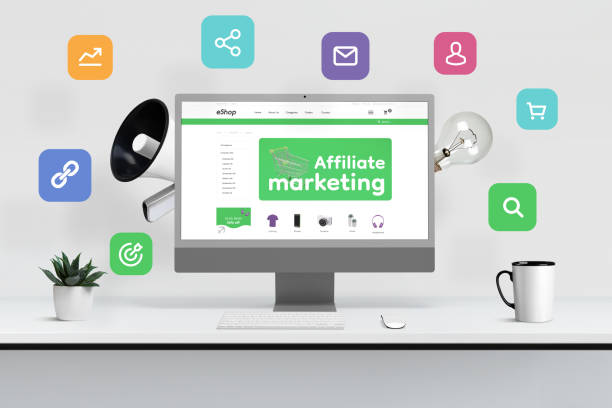When I first stumbled across affiliate marketing, I thought it was just about dumping links online and waiting for commissions to roll in. I was wrong. But once I understood how it actually worked and stopped chasing hacks, things changed fast.
Affiliate marketing is one of the most beginner-friendly ways to earn income online. It doesn’t require your own product, customer service, or huge upfront investment.
At its core, affiliate marketing means promoting other people’s products online and earning a commission every time someone buys through your link. It’s simple to start, but a smart strategy is what makes it sustainable.
Who This Guide Is For:
- Beginners: If you’re starting from zero with no tech background or audience.
- Bloggers & Writers: Want to monetize your blog with passive income streams?
- Content Creators: Whether you’re on YouTube, TikTok, or Instagram, this guide helps turn content into commissions.
- Side Hustlers: Looking to earn part-time income online without creating your own product.
What You’ll Get:
- A step-by-step breakdown from picking a niche to earning your first commission.
- Real tools, templates, and affiliate platforms you can start using today.
- Pro tips most free guides don’t share (like ethical linking & optimization).
- Growth strategies to scale once your system starts working.
What Is Affiliate Marketing and How Does It Work?
Affiliate marketing is a performance-based online income model. Here’s how it works:
- You sign up for an affiliate program.
- You get a unique tracking link tied to your account.
- You recommend a product or service using that link (in blog posts, videos, emails, or social media).
- When someone clicks and buys, you earn a commission, without having to deal with inventory, customer service, or refunds.
It’s a win-win: companies get new customers, and you get paid for helping connect the dots.
How to Start Affiliate Marketing in 7 Simple Steps
Step 1: Pick a Niche That Has Demand
Choosing a profitable niche is the foundation of affiliate marketing success. You need a niche that:
- Solves real problems
- Has a high demand buying customers
- Offers affiliate programs with high commissions
Examples of profitable affiliate marketing niches:
| Affiliate Marketing Niche | Recommended Products in This Niche |
|---|---|
| Personal Finance | Credit cards, budgeting tools |
| Health & Wellness | Supplements, fitness gear |
| Online Business | Headphones, laptops, and SaaS products |
| Tech & Gadgets | Headphones, laptops, SaaS products |
| Education | Online courses, tools like Grammarly |
Find: High-Paying Affiliate Programs in Different Niches
Step 2: Decide on Which Platform to Use
This is where you’ll create content and publish affiliate links. Popular platforms used for affiliate marketing include:
- Blog – Ideal for SEO and long-term content monetization
- YouTube – Great for product reviews, tutorials, and faceless videos
- Email List – High-converting and builds direct relationships
- Social Media – Perfect for visual or lifestyle niches (Instagram, TikTok)
On a tight budget?
- Start an Affiliate Review Blog From Scratch
- Use free tools like Carrd or MailerLite landing pages
Tip: Compare: Blog vs. YouTube – Which Should You Start?
Step 3: Sign Up With Affiliate Programs That Align With Your Niche
Not all affiliate programs are created equal. Look for:
- ✔️ High-quality, trusted brands
- ✔️ Good commissions (10–50% is great)
- ✔️ Reliable tracking and payouts
Popular Affiliate Networks:
Step 4: Create a Content Plan
You need content that helps, not just sells. The best affiliate marketing strategies involve:
- Solving problems
- Providing real value
- Naturally recommending tools/products
Types of high-converting content:
- Product reviews
- Comparison posts (X vs. Y)
- How-to guides
- Listicles (e.g., “Top 5 Tools for New Bloggers”)
Related: How to Increase Blog Traffic
Step 5: Get Traffic and Build an Audience
Affiliate income depends on clicks and conversions.
Quick beginner traffic tips:
- Learn basic SEO (target low-competition, buyer-intent keywords)
- Promote on Pinterest, Reddit, or niche Facebook groups
- Start an email list from day one
Tip: Build an Email List from Scratch
Step 6: Add Affiliate Links Ethically
Affiliate links must be disclosed. It’s legally required and builds trust with your readers.
Best practices:
- Add a simple disclosure like: “This post contains affiliate links. I may earn a small commission if you purchase through my links, at no extra cost to you.”
- Use link management plugins like Pretty Links or ThirstyAffiliates
Tip: FTC Disclosure Guidelines
Step 7: Track, Optimize, and Scale
Once you’re getting traffic, it’s time to measure and improve.
Tools for tracking affiliate link performance:
- Google Analytics – Monitor user behavior and traffic
- Pretty Links – See which affiliate links perform best
Start split-testing:
- Headlines
- CTAs
- Button placement
Double down on what’s working. Cut what isn’t.
Common Affiliate Marketing Mistakes to Avoid
- Promoting poor or unrelated products
- Overloading posts with links
- Ignoring user experience (slow site, hard-to-read content)
- Not disclosing affiliate links
- Expecting fast results without consistent effort
FAQs on How to Start Affiliate Marketing
- Do I need a website to start affiliate marketing? No, but it helps. You can also use YouTube, email, or social media.
- Is affiliate marketing legal? Yes, just follow proper disclosure rules.
- How much money can beginners make with affiliate marketing?
Anywhere from $50 to $5,000/month, depending on traffic and niche. - What’s the best affiliate program for beginners? Amazon Associates is beginner-friendly. ShareASale and Impact offer higher payouts.
- How long does it take to see results? Typically, 3–6 months of consistent content before you see steady affiliate income.
- Can I do affiliate marketing without showing my face? Absolutely. Blog posts, email marketing, or even faceless YouTube videos work.
- How do affiliate marketers get paid? Usually via PayPal, direct deposit, or check, depending on the network.
- Do affiliate links expire? Some do. Always check the program’s terms.
Final Thoughts: Start Small, Stay Consistent
Affiliate marketing isn’t about quick wins; it’s about building a value-first system that helps people and pays you in return.
Pick a niche. Start creating helpful content. Promote what you believe in. And as your audience grows, so will your income.
Affiliate marketing in 2025 is more accessible than ever. So if you’re serious about earning money online, there’s no better time to start.






